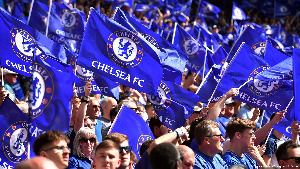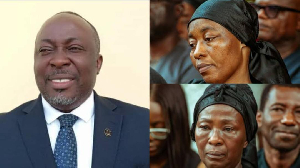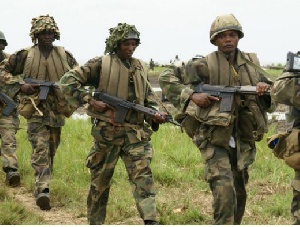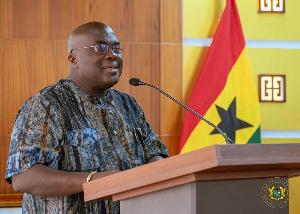SAVING GBAGBO’S PRESIDENCY WITH THE LANGUAGE OF DIPLOMACY
BY SAMUEL ADJEI SARFO
Ghana's president has said he does not think military force will solve the post-election deadlock in Ivory Coast. President John Atta Mills also said Ghana would not take sides in the stand-off between incumbent leader Laurent Gbagbo and his rival, Alassane Ouattara.
This statement, taken in isolation, may sound innocuous enough, and may also be construed as the peroration of a pacific government. But within the Ivorian context, it is clearly a declaration of support for Gbagbo and an affirmation of the status quo ante bellum. If in doubt, look who is gloating over the Government’s position: the Gbagbo-controlled Ivorian media is running panegyric praises for Ghana’s president for his so-called peaceful stance. This is because Gbagbo contemplates that the logical consequence of a “peaceful resolution” is some sort of power -sharing in which he will remain President. And that is all the man has bargained for from the very beginning since he lost the Ivorian elections.
Indeed, Gbagbo himself does not believe in the results as fabricated by the Constitutional Council. If he were so convinced that he won the elections, he would not be banking on any power- sharing arrangements with Ouattara. Again, if he were so convinced that he won the elections, it should not be difficult for him to publish his version of results for the scrutiny of the whole world. The burden of proof lies with him. Instead, what does Gbagbo do? A day after the announcement of his version of results, the man simply wrapped himself in his national flags and swore himself back into power. By this action alone, he foreclosed any dialogue about the merits of the results and declared himself the winner. In short, he has pegged himself on the mountain of power like a goat and dared his challengers to dislodge him from his perch. Indeed, his request for a recount of the votes is coterminous to a player-turned referee who annuls the legitimate results of a match, declares his side the winners and thereafter invites spectators to come for the single purpose of affirming that he won according to how he himself judged the game. If Gbagbo was looking for any objective truth about the elections, he wouldn’t have declared himself a winner a day after the Independent Electoral Commission and the mass of international observers declared Ouattara the true winner. He would have waited and used both substantive and procedural due process to challenge the results. As the situation stands, Gbagbo chose to reconstruct his own reality and to invite the world to authenticate it for him. Thus any recount he is now requesting simply aims to delegitimize the conclusions of all those international observers and to create a huge pretext and paradigm for other demands which will eventually collapse the mountains of evidence that Ouattara truly won the elections. After all, if the election results could be reworked through a recount, then all stages of the elections could be questioned and reworked. This then is the strategy of Gbagbo, that he throws out this harmless gambit of a recount as a means to make other demands which will culminate in a repeat or repeal of the elections. Thus it is dangerous for the world to listen to Gbagbo’s request for recount; it is intended for one purpose: to buy time for more requests. It is informed by chicanery and borne of ill faith.
The arguments of the Gbagbo faction are specious to the core, and there are ways to determine specious arguments: For example, if a person lines up all the villains of history to justify his own actions, that simply means that the person is aware of his sins but is trying to get away with it because some villain in the past also got away with it. Our question to such a person should be “What happened to all the heroes in history?” A major argument of the Gbagbo faction is that all over the world, others stole elections and went scot free, therefore Gbagbo should also be left alone. People have cited Kenya, Zimbabwe, Burma and Nigeria as their examples of places where elections were stolen while the world helplessly watched. Here then, these people are impliedly agreeing that Gbagbo indeed stole the elections but must be left alone because the world watched while others stole elections elsewhere. Why must Gbagbo find solace with only the crooks and fall guys of history? What happened to the exemplary act of the NPP government in Ghana that turned over the government to the opposition even on a 40,000 vote loss? Why can’t Gbagbo follow this shining example and do the right and honorable thing? Why has he decided to make the villains of world civilization his cronies and bedfellows?
Again, we can determine specious arguments through the lens of those who are ideologically or religiously tainted: the answers have been framed for them by their religious and ideological godfathers and godmothers, and there is nothing further for them to understand through their own critical reasoning. Otherwise how on earth does the issue of a stolen election evolve into a debate of Muslim domination? How does plain electoral larceny become an issue analyzed on the basis of capitalist/socialist dichotomy? If I posit that the election in Ivory Coast was properly conducted and the outcome clearly decided by the Independent Electoral Commission, I state the issue clearly for the purpose of debate, and the discussion ought to proceed on why I am wrong and somebody else is right. However, if the matter is conflated with socialist/capitalist ideology, or Muslim/Christian power struggle, then it becomes subsumed under the rhetoric of demagogues, and we side-step the core questions we must soundly debate. We must avoid the convolution of issues in order to ensure a coherent debate about the Ivorian situation, which is simply about who truly won or lost the presidential elections and why and how.
Furthermore, if a person sees the issue through the lens of tribe, party or personalities before settling on the truth, the person is simply not reasoning before concluding. If the truth is hiding in the corner of Honolulu, or comes through the mouth of our worst enemies, or emanates from an opposing party or tribe, the principle is the same: we must accept the truth and let it guide us. And to determine truth, we must use the universal principle that long after we are gone, whether we lived at the south pole or the north pole, posterity will validate the conclusions we drew and the actions we took. The beauty of truth is that it has no color, tribe, party, ideology or geography. The truth about the Ivorian presidential elections is that Ouattara soundly beat Gbagbo who has decided to commit the theft of office.
We must also research thoroughly and come up with iron-clad arguments that are not easily penetrated by our adversaries. In this day and age, knowledge acquisition is no longer difficult. The internet affords a huge resource for research into a huge corpus of knowledge. We must therefore consult it to dig for the panoply of facts which will shape our thinking. That way, we will apprehend the truth for ourselves, and we will not become victims of the fallacy of false authority. Remember that our pastors, broadcasters and politicians have little time for in-depth research and put out many unsupportable views. They are simply purveyors of the fallacy of false authority which simply means that they pontificate about issues over which they have not taken the time to acquire the requisite knowledge.
The Ivorian situation requires full knowledge of the prevailing facts and arguments. This is more so because misleaders are abroad; they have taken hold of the popular imagination by taking cover under diplomatic language to aid and abet palpable fraud. They have flaunted the ideals of patriotism in order to compromise truth under its sacred name. They have conflated and confused the issues by a reliance on ideological and religious schism. They traduce unity through ethnocentric insinuations of other citizens’ pedigree in order to tweak the tested electoral outcome. Through digressive and distractive tactics, they have mortgaged the Ivorian fortune, sold their conscience for a pittance and subverted lies for truth……..But the Ivorian issue is clear and simple; it is about virtue and vice, about truth and false hood… about the master act of a mountebank parading mischief with his thirty shekels of silver with which he seeks to purchase the conscience of a whole people………
There are concerns expressed that many African leaders are closely watching what happens in Ivory Coast. If Gbagbo succeeds in clinging to power, the NDC may replicate the Ivorian situation in this country, and many leaders in Africa will join in this political chicanery. From then on, democracy will be erased since all that a loser must do is to dispute elections and stick to his guns; then some power-sharing ensues with the loser as the president and the winner in some inferior position. Thus, the travesty of democracy is waiting to begin in Africa.
And let us make no mistake; even under the present dispensation, the travesty of democracy is still a dangerous possibility in Ghana. For example in the 2008 elections, Hackman Owusu Agyemang stole his way to his office by working to disqualify Dr. Samuel Annor in the New Juaben North Constituency primaries. When we the constituents protested against his undemocratic posturing, Hackman used his influence as a former Interior Minister to send battalions of police men to attack us. The fact that he is today pontificating about democracy in Ivory Coast changes nothing in his mind about how to tweak with democracy when it best suits his political ambition. Hackman’s Machiavellian tactics were replicated throughout many of the constituencies without so much as any protestations from Nana Akuffo Addo or the party gurus. This eventually led to the narrow defeat of the NPP in the 2008 elections. Hackman, together with his henchmen is waiting to repeat his fraud, using Gbagbo’s strategy as a template.
Let us also not forget that the NDC government is the golden figment of a coup-maker’s imagination. Somnambulists may call this serial coup-maker father of democracy, but within his own meaning, the usefulness of any democratic dispensation is to apply it as a ploy to perpetuate his grip on power. Rawlings is observing the Ivorian situation closely, reminiscing over what could have been in the year 2000 and what is possible in the year 2012.
My name is Sarfo the Black. I swear and affirm that I am of sound body and mind and capable of coherent articulation about these matters herein expressed. I am neither influenced by Alassane Dramani Ouattara to write whatever I have written here, nor have I sought to undercut the legitimate authority of Laurent Gbagbo by dint of any biased disposition against his person. I have no stake in the outcome of the Ivorian conflict, except as a true citizen of my country; I do not seek any gains or recognition or popularity whatsoever as a result of my position on the Ivorian crisis. Whatever I write about the Ivorian matter, I write out of the deepest recesses of my heart that truth may prevail; that all men and women the world over will be united in their quest for what is eternally right, so that in the end, the people’s voice will be respected in Ivory Coast, and that democracy will triumph throughout Africa………
Samuel Adjei Sarfo lives in Houston, Texas. You can email him at sarfoadjei@yahoo.com
Opinions of Sunday, 16 January 2011
Columnist: Sarfo, Samuel Adjei












